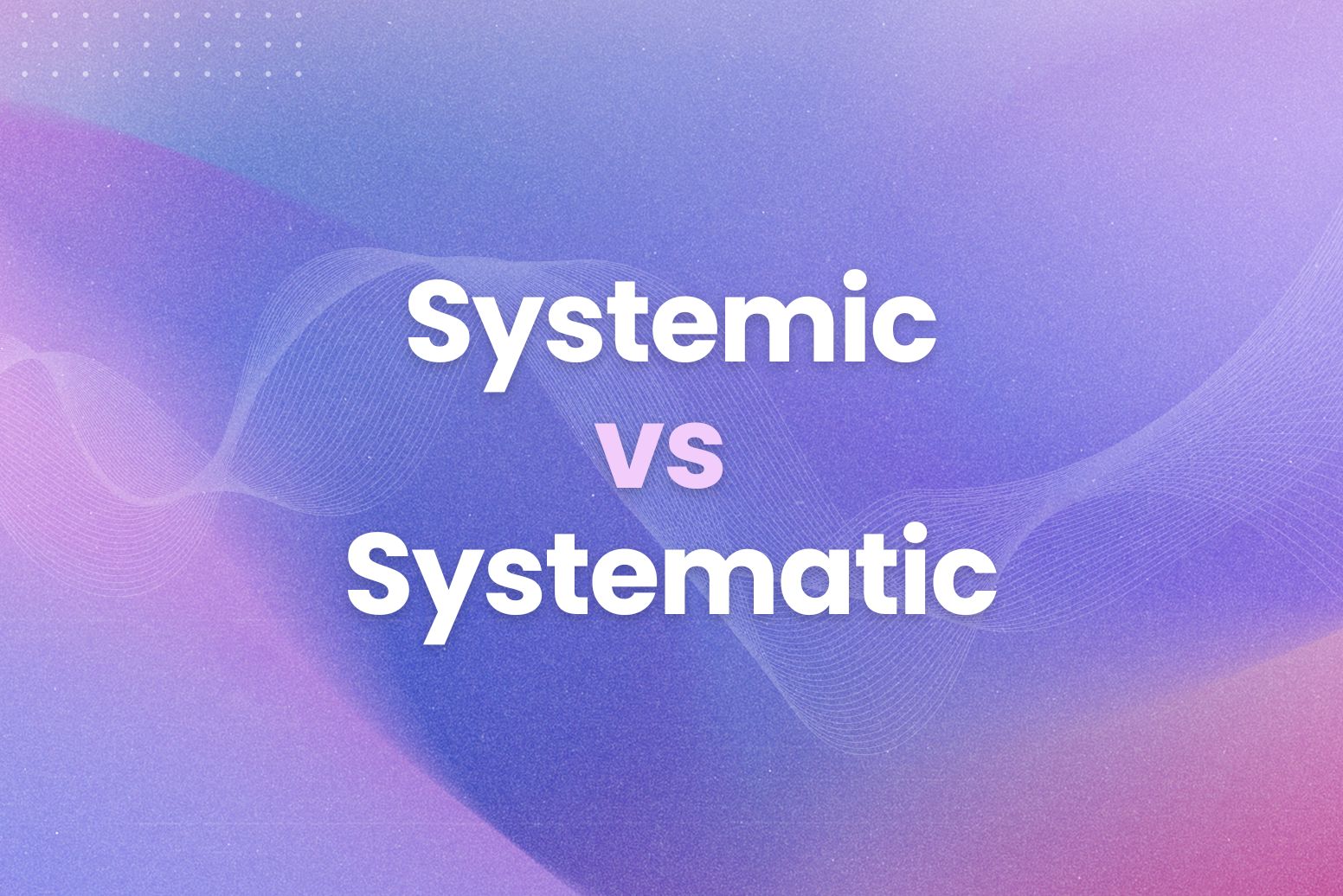Have you ever tripped over words that sound the same but mean different things? It’s a common writing pitfall. Using “systemic” when you mean “systematic,” or vice versa, can muddy your message. Consequently, your credibility takes a hit. No one wants that.
This guide clears up the confusion. We’ll show you the distinct meanings of these two words. Moreover, we’ll give you clear examples. As a result, you’ll use them correctly every time.
Here’s what we’ll cover:
- The precise definition of systemic and systematic.
- Clear examples of systemic and systematic in a sentence.
- Easy ways to remember the difference.
Systemic and Systematic: Definitions
Let’s get straight to the point. What do these words actually mean? It’s time for some clarity.
- Systemic: This word relates to a system as a whole. In other words, it affects the entire system, not just parts of it. For example, a systemic issue impacts all levels of an organization. It’s built into the structure.
- Systematic: This describes something done according to a fixed plan or method. That is to say, it’s methodical and organized. For instance, a systematic approach to problem-solving involves distinct steps. It’s about following a process.
To clarify further, think of it this way: “systemic” is about what is affected (the whole system). On the other hand, “systematic” is about how something is done (with a method). Moreover, this distinction is key to using the words correctly.
A simple example: A systemic failure in a company’s accounting department (meaning the entire department is flawed) requires a systematic review of all accounting procedures (a step-by-step, methodical investigation).
We could add a table here to further illustrate the difference:
| Feature | Systemic | Systematic |
| Focus | The whole system | A method or plan |
| Impact | Affects all parts of the system | Follows a specific procedure |
| Adjective Type | Relational (relating to a system) | Descriptive (describing a method) |
Systemic and Systematic: Examples in Action
Seeing these words in context is crucial. Therefore, we’ll provide some clear examples. This will solidify your understanding.
Systemic Examples
- Systemic racism is a problem that affects all aspects of society. In other words, it’s not isolated incidents; it’s woven into the fabric of institutions.
- The company experienced a systemic failure in its supply chain. Consequently, deliveries were delayed across the board. The entire system was affected.
- A systemic review of the regulations is needed. That is to say, the current rules have flaws that impact the whole process.
- The widespread corruption represented a systemic issue within the government. In short, it wasn’t just a few bad apples. It was a problem throughout.
Systematic Examples
- The detective used a systematic approach to solving the case. For instance, he carefully collected evidence and interviewed witnesses in a set order.
- We need a systematic plan for implementing the new software. That is to say, we need a step-by-step process.
- She took a systematic inventory of all the supplies. In other words, she followed a detailed list.
- He made a systematic search of the house. As a result, he found the missing keys. He searched methodically.
As you can see, the context makes all the difference. Systemic refers to the scope of the issue. On the other hand, systematic refers to the method used.
When writing, it can be tough to catch every error. Similarly, it’s easy to second-guess your word choice. Arvin, the GPT-4 powered browser extension, can help. For instance, you can use Arvin to check your writing on any webpage. It can flag potential issues with word choice, ensuring you’re using systemic vs systematic correctly. This is just one of the ways Arvin can help improve your writing.
Easy Ways to Remember the Difference
So, how can you keep these two straight? Here are some simple tricks to help you remember.
- Systemic = System-wide: Think of “systemic” as relating to the entire system. The “ic” ending relates it directly to the system itself. For example, a systemic problem affects the whole system. This is a simple association.
- Systematic = Methodical: Think of “systematic” as relating to a method or system of doing something. The “atic” ending suggests a process or procedure. For instance, a systematic approach follows a set of steps. It’s about having a plan.
To clarify further, try this:
- If the problem is widespread, it’s systemic.
- If the approach is structured, it’s systematic.
Another helpful tip: Consider the word system. “Systemic” describes something of or relating to a system. It’s an adjective that describes the system itself. Consequently, it has a broader scope. “Systematic” describes how something is done within a system. Therefore, it’s about the method.
For example, if a computer network has a systemic vulnerability, it means the entire network is at risk. On the other hand, if a technician performs a systematic scan of the network, they’re following a precise, planned procedure.
Write with Confidence: Arvin’s Got Your Back
We’ve explored the differences between systemic vs systematic. Now you know how to use these words correctly. Remember, “systemic” refers to the whole system, while “systematic” describes a methodical approach. With these simple tips, you can avoid common writing errors.
Here are the key takeaways from systemic vs systematic:
- “Systemic” relates to the entire system.
- “Systematic” describes a planned method.
- Think “system-wide” for systemic and “methodical” for systematic.
- Context is key to understanding the correct usage.
Getting your grammar and word choice right can be tricky. But it doesn’t have to be. With Arvin, you have a powerful tool to help you write with confidence. Arvin, powered by GPT-4, can check your writing on any webpage.
It can catch those pesky errors and ensure you’re using the right words in the right context—whether it’s “systemic” or “systematic.” So, give Arvin a try and see how it can improve your writing today.
FAQs About Systemic vs Systematic
What is the difference between systematic and systemic?
“Systemic” describes something that affects an entire system. It’s about the scope of an issue. For example, systemic poverty affects all parts of a society. On the other hand, “systematic” describes a method or plan. It’s about how something is done. For instance, a systematic review follows a defined process. It’s about the methodology.
What is the difference between systematic and systemic thinking?
Systemic thinking considers how different parts of a system interact and influence each other. It looks at the big picture. In other words, it’s about understanding the connections within a complex system.
Systematic thinking, on the other hand, is a structured and organized approach to problem-solving. It involves breaking down a problem into smaller parts and addressing them methodically. Therefore, it’s about the method of analysis.
What is the difference between systematic and systemic error?
A systemic error affects the entire system or process. It’s usually due to a flaw in the design or structure. For example, a bug in the core code of a software program would be a systemic error. A systematic error is a consistent error that occurs repeatedly in a measurement or experiment. It’s often due to a problem with the equipment or methodology. For instance, a miscalibrated scale would cause systematic errors in weight measurements.
What do you mean by systemic?“Systemic” means relating to or affecting a whole system. It implies that the issue is not isolated but rather deeply embedded within the structure of the system. For instance, systemic change requires addressing the root causes of problems within the system itself, rather than just treating the symptoms.






